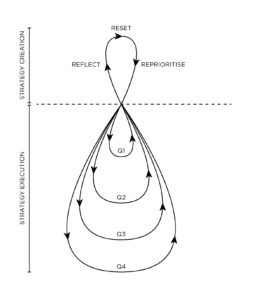POSITIVE ACCOUNTABILITY
Does your business have an accountability loop?
Mine does.
Every quarter (for the last nine quarters) – my team and I have spent 3-days working on the business, not in the business. It all centres around an online quarterly immersion run by Thought Leaders Business School (TLBS). These are critical touch points for us where we tap into a community of people who, like me, run a practice, not a business.
We use these immersion weeks to check-in on our annual plan; celebrate our wins; learn from our mistakes; identify our opportunities and reset our individual and collective priorities for the quarter.
TLBS is my positive accountability loop. And I pay handsomely for the privilege.
I’ve toyed with the idea of saving that time and investment. I think “’I’m in the habit now…I could run these quarterly sessions myself.”
But I know deep in my gut that unless I place high value on this activity – I will most likely put it off (or turn it off) and ultimately my practice will slow.
Gilbert Enoka is the former mental skills coach of the New Zealand’s All Blacks and now motivational speaker. Over the past three decades, Enoka has built his reputation as New Zealand’s leading mental skills coach. He delivered a powerful keynote last week at our conference about what he saw as the three key drivers of high performance. He listed these as;
- MINDSET
- SKILLSET
- STRUCTURE
High performers need a strong mindset, a well-developed skillset, and the structures to support habits and practices.
Enoka asks – which of these three are the most important in driving high performance?
Well…what do you think it is?
Most people, he explained, would typically think MINDSET is the most important. But in actual fact, while high performance demands all three – Enoka believes that STRUCTURE is by far the important driver.
In his context, athletes must have great skills and a strong mental attitude. But ultimately, it’s the structures around athletes that amplify their talents and mental strengths. Unless they are supported by strict regimes and training schedules, coaches who drive their fitness, diet, psychological health, financial wellbeing and home life, they minimise their opportunity to perform in the moments that matter most, on the field.
It’s the same for business. Unless you create the structures that sustain the operating and performance rhythms of your business – you minimise the opportunity for the business to deliver on its purpose and achieve performance goals.
THE ACCOUNTABILITY LOOP:

It’s the same for business. When CEOs create the structures that sustain the operating and performance rhythms of their businesses – they maximise the opportunity for the business to deliver on its purpose and achieve performance goals.
High performance organisations embed systems for leadership, for culture and for strategy. A quarterly and annual strategic planning exercise is a strategy structure. A leadership retreat where leaders give and receive feedback about their behaviour is a leadership structure. An annual performance review where team members have the opportunity to set performance and development goals is a culture structure.
One of my most in-demand offerings is to facilitate strategic planning days for fast-growth businesses – one and two-day retreats where senior teams discuss, debate and innovate to ultimately align on a one-page business plan. A simple, elegant map to win in their market. I can always pick the clients who are ultimately going to be successful in the execution of their plan. They are thinking beyond the retreat. These are the clients who book 1-day quarterly check-in sessions like clockwork; who schedule their retreat in the same month each year; who plan their budget cycles, performance reviews, and salary reviews all around the same rhythm.
Fast-growth, high performance businesses know that producing a plan only takes them 20% of the way there. Executing the plan takes discipline, focus and an unwavering belief that those days out together working on the business is more valuable than a whole month of sales (and actually costs a whole lot less).
And even though I write, speak and teach this stuff, I’m not exempt. Every coach needs a coach. Every therapist needs a therapist. We all need structures that act as positive accountability loops to help keep us honest and stay on purpose. TLBS is my support structure. What’s yours?